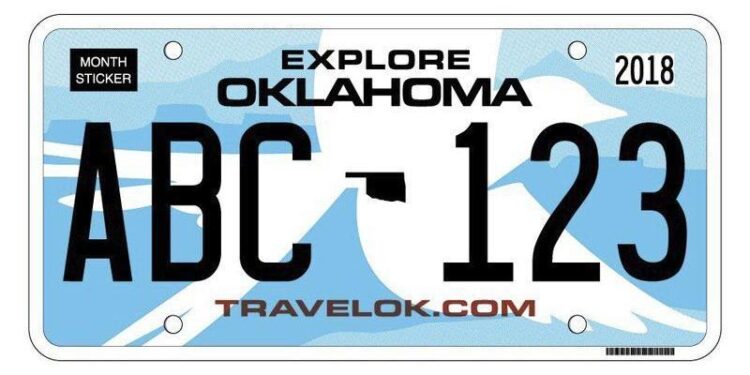Gov. Kevin Stitt said car tag compacts with tribal governments in Oklahoma is crucial for reasons of public safety and funding. But he concedes that forcing the tribes to the negotiating table isn’t going to happen.
“You can’t. That’s the problem,” Stitt said in a virtual press conference Thursday when asked if the State of Oklahoma has the option of forcing tribes to reach agreement with Oklahoma on the issue of access to tribal car tag information.
The issue is one that dates back decades, when a court decision allowed tribal governments to issue license plates on behalf of their nation to tribal members. Even in the beginning, law enforcement entities were concerned about having access to information on drivers with license plates issued by someone other than the Oklahoma Department of Public Safety. That issue has become more pressing in the last year as Oklahoma’s turnpike system converts to the Plate Pay system where cameras snap pictures of the license plates of vehicles passing through toll booths, billing those without a PikePass based on the registered owner of the plate.
The system specifies that those who don’t pay their tolls cannot renew their license plates until their tolls and fines are cleared. Drivers with tribal-issued license plates are not in the state’s system and thus can’t be punished for not paying their tolls.
Stitt wants to negotiate with tribes to craft compacts that would require tribal governments to provide the Department of Public Safety information on those drivers, a move he said would ensure law enforcement could confidently identify all vehicles on Oklahoma roads and that the turnpike system can read tribal tags. Thus far, the state has only one car tag compact, a 10-year agreement with the Chickasaw Tribe announced earlier this month along with a new tobacco compact.
“This is a public safety issue,” Stitt said, adding he’s looking at the issue from multiple angles, including financial.
He said tribal governments could print license plates for their members, then charge a fraction of the cost the State of Oklahoma charges — an incentive for qualified drivers to register their vehicles with their tribe rather than the state. None of that money comes back to the State of Oklahoma, Stitt said, comparing the tribal-issued system to a resident who buys a $59,000 truck (the average cost of a new truck in Oklahoma), then has to pay $2,655 to the State of Oklahoma in taxes. Those funds, in turn, support roads and bridges, Stitt said, adding estimates indicate Oklahoma lost more than $2 million in revenue last month because of the tag issue.
“I cannot believe more people aren’t fired up,” Stitt said, adding that single mother would have to pay $2,655 to the state, while someone who looks like him — a Native American — “may pay nothing.”
“We need uniformity across all the tribes. We need to have an honest conversation.”
Stitt said the issue also is one of public safety, explaining if vehicles aren’t registered in the State of Oklahoma, they are not in the license plate data system that law enforcement accesses when they stop a driver before approaching the vehicle, creating a dangerous situation for officers. He said that is part of the reason he is a proponent of what he calls “a honest conversation” with tribes, adding that if only half of the state’s drivers pay their vehicle tag fees each year, Oklahoma has only half of the revenue for roads and bridges.
The issue can’t be compared with situations in other states, he said. He used the Navajo Nation as an example, explaining that the State of Arizona doesn’t provide services on that reservation: no roads, no bridges, no public schools. The tribe covers those costs on its land.
“That’s why you can’t apply their rules to Oklahoma. It’s not going to work,” he said, adding the rules in Oklahoma are different and it’s not fair to give one race special treatment over another.
He said there may be options to explore: perhaps limiting those with tribal tags to living on or driving on trust land, but those lands comprise only a small part of Oklahoma. He said that is why compacts are necessary, but it won’t be an issue easy to resolve.
“There is no way to compel them and that also is problematic,” he said.
Want to reach a local audience and grow your business?
Our website is the perfect platform to connect with engaged readers in your local area.
Whether you're looking for banner ads, sponsored content, or custom promotions, we can tailor a package to meet your needs.
Contact us today to learn more about advertising opportunities!
CONTACT US NOW




